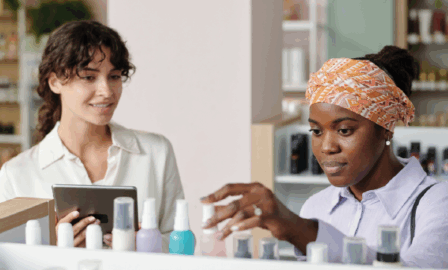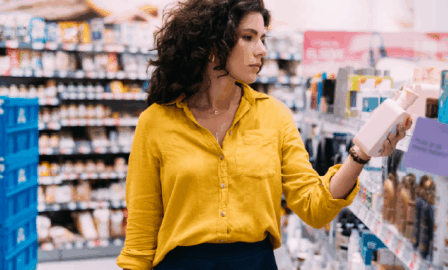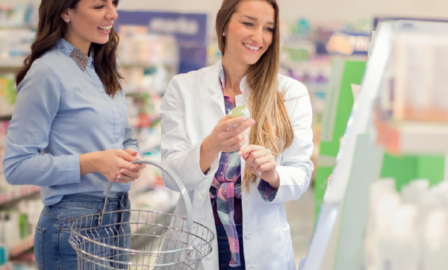Clarifying the Impacts of the Coronavirus on the Beauty Industry
Recently, the outbreak of coronavirus on a global scale has caused severe economic consequences within the Health and Beauty sphere. The US stock market has seen detrimental impacts in the first quarter with the worst one-day slide in two years, dumping stocks 3 percent. U.S consumers are changing their buying behaviors due to the outbreak, with 27.5% saying that the outbreak has led them to limit or avoid public areas, and so are consumers around the rest of the world. China is specifically facing issues that this epidemic has caused, leading to disruption of the supply chain, projected decreases in revenue and sales within all industries, but especially the beauty industry, as well as the concerns of health within the production factories and other public spaces.
Many luxury beauty companies rely on production sites in China for their manufacturing needs. China also has one of the world’s largest economies and accounts for a third of luxury spending. And with the temporary paralysis of the Chinese economy, world supply chains are being detrimentally affected. The reliance on China for access to a wide-reaching workforce and manufacturing capabilities, has contributed significantly to China’s influence on the global economy. With the outbreak of coronavirus beginning in Wuhan, Hubei Province, China, a major port city, and spreading on a global scale, this means that companies must find ways to protect their goods, sales, and employees from the virus.
Coronavirus Contributions to Decreasing Sales and Other Impacts
Luxury beauty companies are seeing a decrease in sales because of declined foot traffic within their physical storefronts, and travel restrictions. The decrease in the number of visitors to storefronts has been directly impacted as a result of the strict travel regulations in place and is a significant reason the beauty industry will experience a drop in revenue. Estee Lauder cited that in 2018, travel retail made up about 18 percent of the total $13.7 billion in annual sales, while companies such as P&G claim that 17,600 products have the potential to be affected by the outbreak. The negative impact on sales caused by the coronavirus outbreak have many companies scrapping their outlook plans for the second quarter in 2020 and potentially through the rest of the year. While Estée Lauder is predicting cuts in their overall sales for the next quarter, L’Oreal is confident that they will weather the epidemic with minimal losses. Many companies such as L’Oréal are predicted to see at least somewhat significant impacts due to such heavy reliance on Chinese manufacturers and a lack of diversified production suppliers.
The disruption of the overall supply chain is fueled by the postponements and cancellations of many cosmetic-specific shows and expos, including the Luxe Pack Shanghai show which is the second of two shows that have been postponed so far. These shows are crucial to the year’s revenue because they help to create demand for the new season’s products. Preventing further spread of the disease is the key reason for postponing these events, resulting in beauty companies seeing a decline in new business that would otherwise be spurred on by the press coverage of such expos.
The factor doing the most damage to revenue is the actual closing of the factories that are the main suppliers and producers of these products. Because many Chinese workers are leery of outside contamination, and factories do not want to further spread the virus, with many factories remaining closed and on high alert as a way to continue mitigating the spread of the virus. This will have significant impact on the beauty industry, within the first quarter of 2020 and potentially longer, depending on how long the outbreak lasts. Beauty retailers are feeling the effects of the disruption and “a China beauty distributor that works with brands including Drunk Elephant, Supergoop and Ouai, said his firm was facing disruption along their internal supply chain due to quarantined workers.” With the delay in opening of the factories, as well as lack of a full manufacturing force until the epidemic is fully resolved, there will be a trickle-down effect for many of the companies who have a lack of production site diversity, leading to shortages and delays in product distribution.
What Companies Can Do to Mitigate Impacts of the Coronavirus
The digital sphere has proved to be a key player for many companies looking to maximize sales until the outbreak subsides. Many companies have turned to creating and opening omnichannels for customers to purchase products through means of various digital channels, rather than having to visit stores. Consumers in China have severely limited their exposure to public places and external goods in order to limit contamination. Big brand companies have had to close their storefronts throughout the country and using various digital platforms to help minimize sale loss is something that companies such as BrighterBeauty have optimized, creating a WeChat Mini Program for clients to order facial sprays, collagen shots, probiotics, and protein powder.
The Takeaway?
With the coronavirus officially present on 6 out of the 7 continents, the impact of the disease on the beauty industry supply chain is widespread and severe and emphasizes the increasingly interconnected and global world.
Focusing in on specific consumer trends and needs in the face of epidemic is something that has helped to keep companies afloat. Many companies have made significant donations towards finding an effective inoculation and treatment and hope to cut down on the time it takes for the industry to get fully back up on its feet, as well as looking out for the consumer and aiding in global epidemics such as this.
If you’re interested in learning more, download our 2020 Beauty and Personal Care Trends here
Subscribe to Clarkston's Insights
Coauthor and contributions by Ashley Stufano



